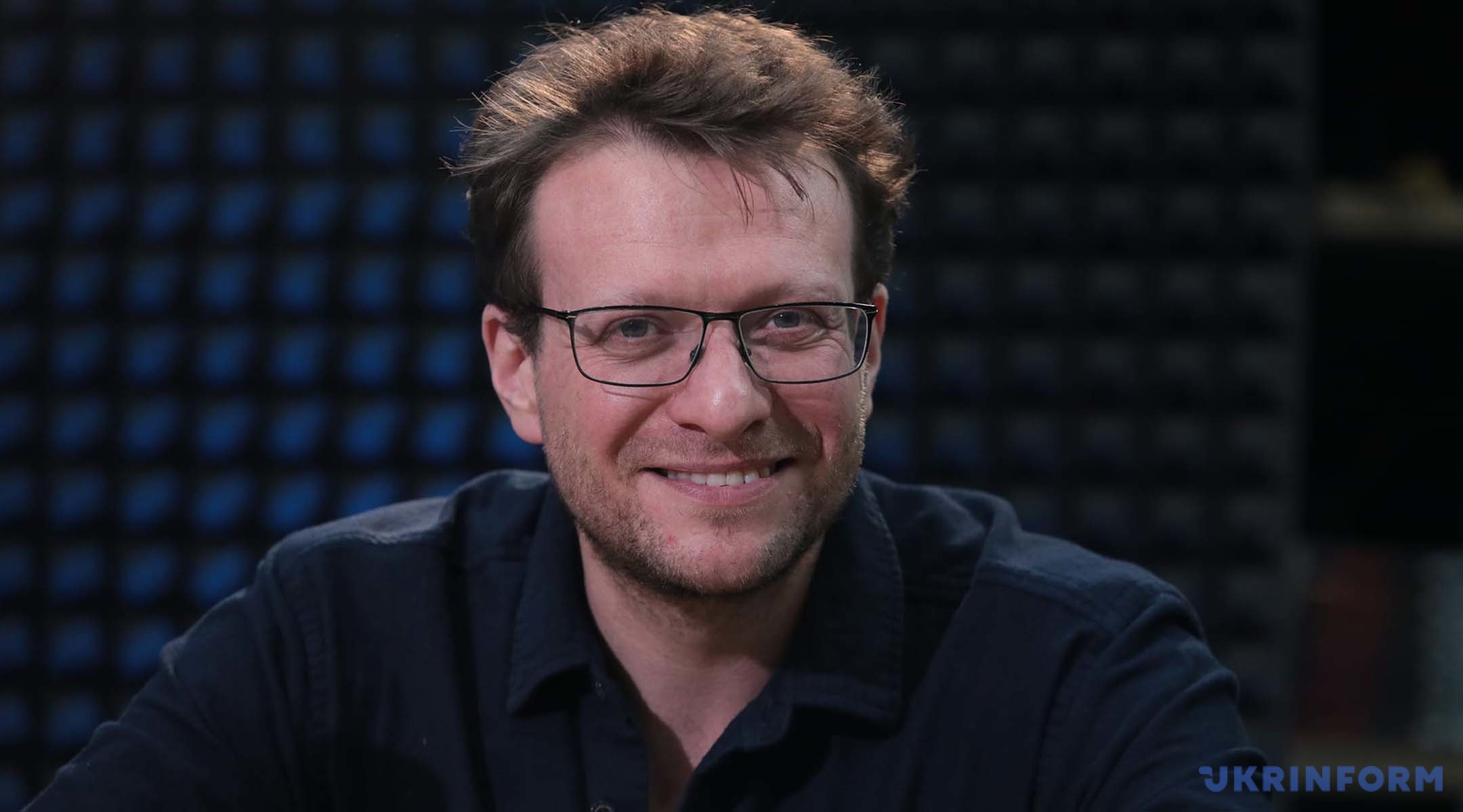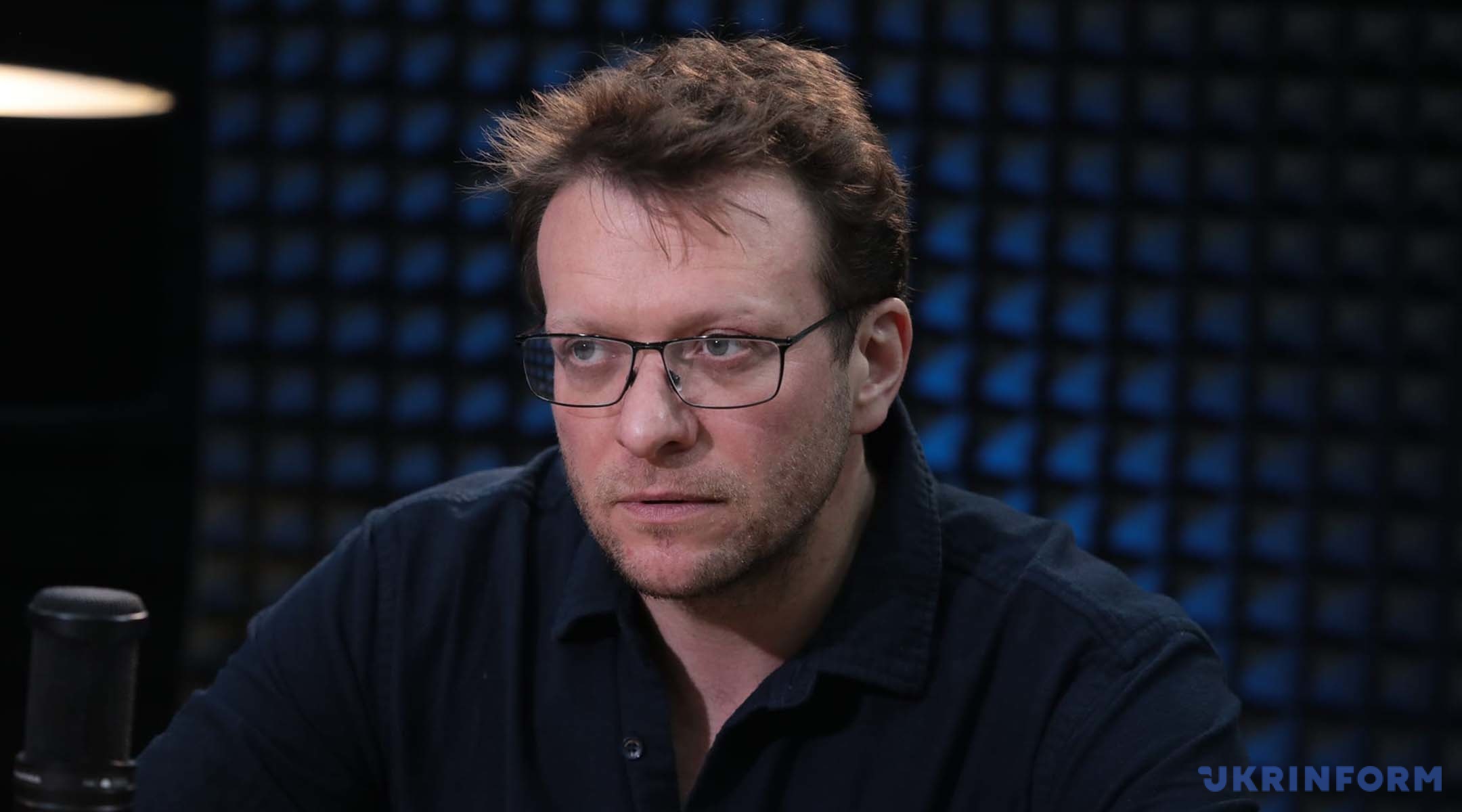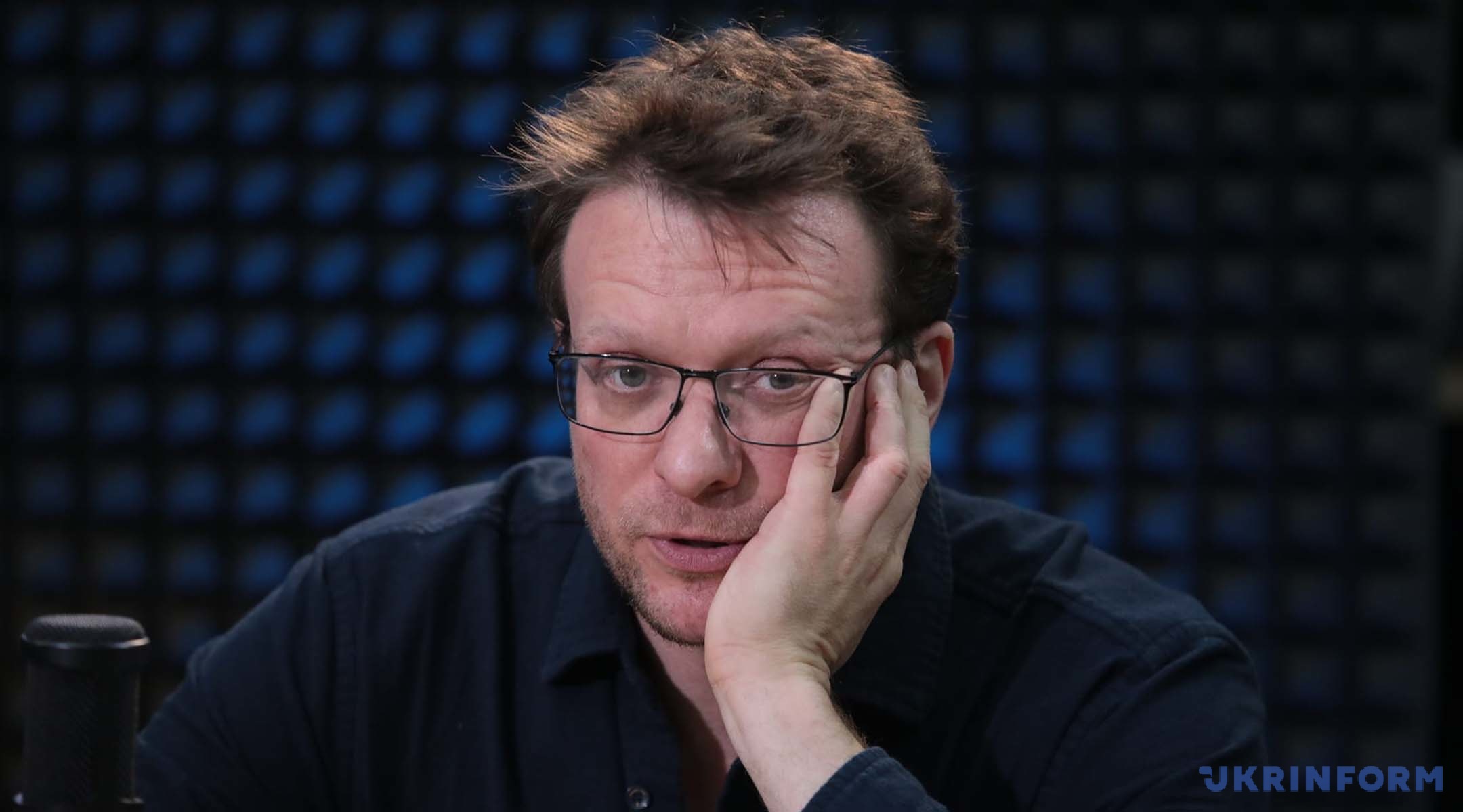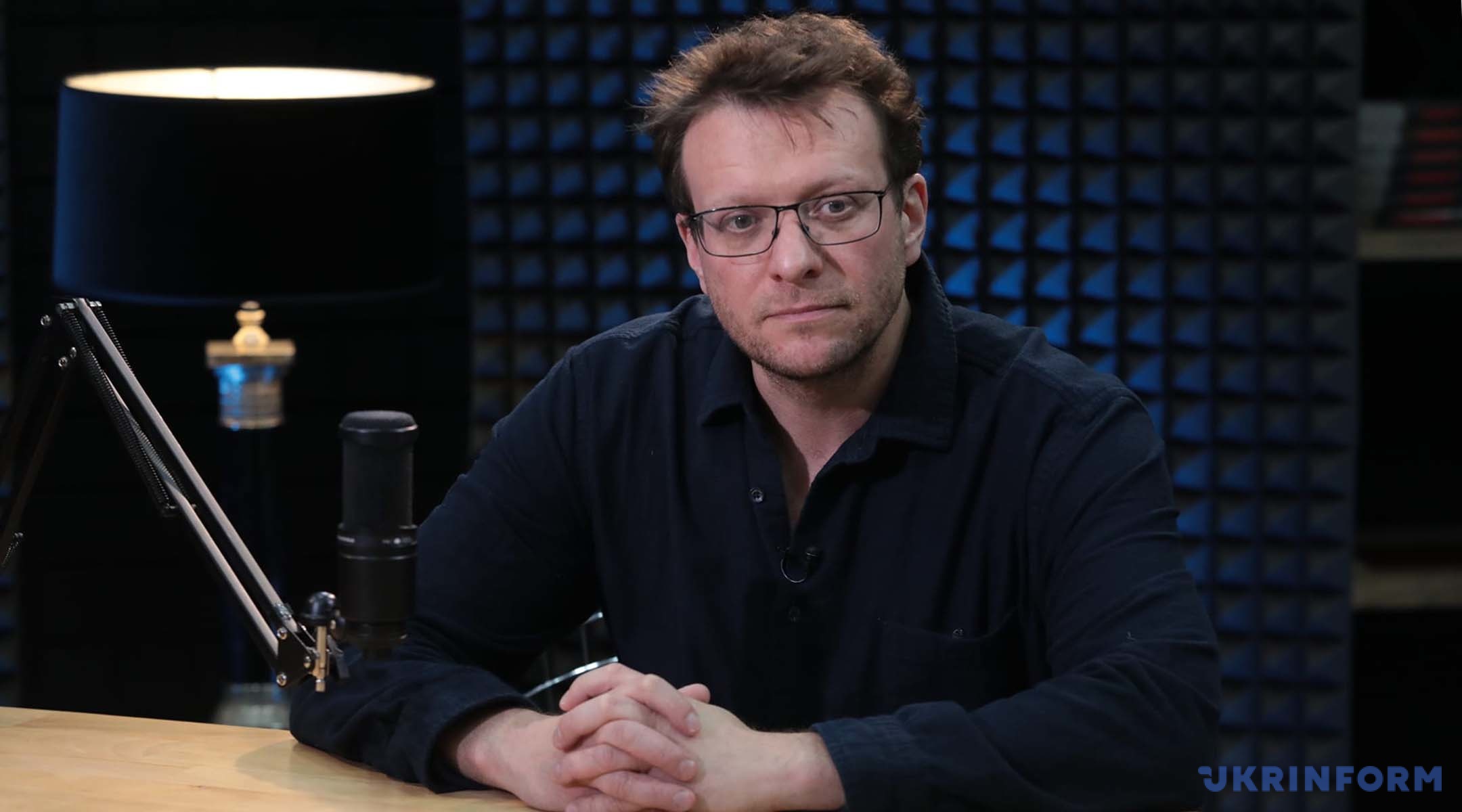An acclaimed British journalist and writer Peter Pomerantsev has been analyzing Russian propaganda and disinformation for years. In an interview with Ukrinform during his latest visit to Kyiv, he shared his vision of what has remained unchanged in propaganda throughout ages and why the West may lose the fight for democratic values if it fails to embrace modern technology as a tool of foreign policies. The researcher also explained how Russian propaganda works best in Europe in the "we are not there" format, using the example of Germany, what is happening with the U.S. support for Ukraine, and what arguments in favor of Ukraine’s cause would be best to appeal to MAGA voters.
IF THERE IS A RECURRING PATTERN IN THE DESTRUCTION OT THE RULE-BASED ORDER, THAT PATTTERN IS RUSSIA
- Currently it seems that the world has plunged into a series of local wars that are gaining momentum. What are the reasons for the exacerbation of modern-day armed conflicts?
- I’m going to be honest, I'm not a grand theoretician of what happens in the world. I study one thing and I write fun, non-fiction books about propaganda and people, and I often avoid this sort of big subjects. But what is very obvious is that is Russia is in the middle of it constantly. And it's kind of a pattern, a repeating pattern. Russia is obviously bringing genocide at the heart of Europe and is also clearly deeply embedded in a network of deeply nefarious dictatorial regimes, which include North Korea and Iran, and helping their proxies like Hezbollah for many years. So, if there's a recurring pattern in the destruction of the so-called rules-based order, that pattern is Russia.
- Do you believe the so-called “axis of evil” has already been formed or is it still on its way?
Russia is obviously bringing genocide at the heart of Europe
- Well, I don't know. That's an old phrase, and maybe we need to think about language a lot and perhaps we sometimes need to find new language… That's very important. I mean, what is it exactly? Axis is a little bit strong, isn't it? It's a group of interests, more like a network, united by corruption, by financial gains, but but also by a deep resentment towards democracy and democratic allies. Their own interests don't always coincide. I don't think Iran and Russia are happy allies, let alone China. But they are a network, also linked united with terrorist and criminal networks. So they're also more like a criminal network, really.

CLEAR AND EFFECTIVE PROPAGANDA IS WHEN “YOU’RE NOT THERE”
- Given your main field of knowledge, we should of course talk about Russian propaganda and the fight against it. We see how Russia skillfully adapts its propaganda guidebooks and tools to react to the latest developments and to tailor its messages to fit concrete audiences, to make sure theses messages get through. And we now see the conflict in Israel and Gaza developing and how Russia uses it to undermine Western assistance to Ukraine by trying to switch the international public focus away from Ukraine. Do you think we in Ukraine are doing enough not to lose the attention of Western partners and to fight this malign propaganda?
- When Russia advocates openly and obviously for what you just said: “Forget about Ukraine, think about the Middle East”, nobody listens to them. That is not a winning narrative because it's Russia, and everyone can see it. That's not the clever bit of their propaganda. What they're doing is much more nefarious. It's effective when it's indirect. Direct propaganda can work if your cause is just and people support you. But everybody knows now in Western countries that Russia is not a partner or anybody you can ever believe.
What they're doing in Europe is much more. What they're doing in Europe is much more cunning and risky to our interests. They are simultaneously stoking anti-Western, anti-Israel, and anti-Semitic feeling among huge Muslim populations in Europe. We see very large protests against the actions of Israel and the West in places like Germany. At the same time, they’re stoking anti-immigrant – in this case, anti-Muslim immigrant, but also general anti-immigrant – feeling among the right wing, again, in countries like Germany. And Russia is not even in that fight. What they're doing is they're strengthening those contradictions, probably thinking about creating a maximally anti-refugee sentiment. Especially in Germany where they’re very invested.
Russia is simultaneously stoking anti-Western, anti-Israel, and anti-Semitic feeling among huge Muslim populations in Europe
And probably they’re calculating that when their bombardment of Ukraine starts, there'll be another wave of refugees from Ukraine, which will be coming into a country that is already super anti-refugee. That's the game they’re playing. Clever and effective propaganda is when “you’re not there”. So when Russia is directly staying stuff, maybe that works for some audiences but not for those that matter very much. No, they're playing a much more potentially effective game.
THERE IS A HUGE GAP IN THE U.S. BETWEEN REALITY AND GROTESQUE POLARIZATION IN POLITICS
- What about the United States? We see that the MAGA wing is getting stronger and the messages Ukraine is trying to convey to their voters seem to not be getting through. That's including that the American money does not actually go to Ukraine but stays on American soil and creates new jobs – that's just one example. We see religious propaganda gaming momentum, those religious conservatives manipulating the topic of Ukraine arresting some priests of the Moscow Patriarchate. Some of those reports could sound ridiculous here in Ukraine but they do find feedback somewhere in rural America. Do you think our civic sector, journalists, diplomats, and politicians are able to win the hearts of more radical Republicans?
- I'm doing a lot of research about public opinions towards Ukraine in America, And the first thing I would say is support for Ukraine is still very, very strong. So i think in America, we see a bigger crisis, which is American politics no longer represents American people. There is a huge divide between the grotesque polarization in American politics and the reality of America. The vast majority of Americans have the right instincts and the right ideas about Ukraine, the right instincts and the right priorities about Putin.
We're just in a very weird place where five extremist politicians can hold the whole of the Republican Party hostage. Just a tiny amount of extremist politicians are playing to a very specific cohorts of society, which is around 15 percent, who they need to stay in power in their states. So they have a very messed up system so please don't get it confused with the American public opinion, which is vastly in favor of Ukraine and vastly against Russia.
We're just in a very weird place where five extremist politicians can hold the whole of the Republican Party hostage
If we’re talking about the MAGA vote, it's around maybe half of Republicans. And again, they're not pro-Russia. The thing is they really hate Biden, more than they hate Putin. And they are anti-Ukraine because they're anti-Biden. Once you’re anti-Biden, you will look for any evidence to be anti-Biden: corruption, “Nazis” in Ukraine – it doesn't matter. But it's that motivational response. So if you want to appeal to this segment of society, which is maybe 15 to 20 percent of Americans, you have to understand what they really care about. I know this sounds really hard but they don't care about Russia or Ukraine. They care about America and they care about their version of America.
And here's the interesting thing about these people. They’re the people who more than anybody else in America think America needs to be the strongest country in the world and show its strength. So, if you want to engage these people, you have to talk to them about American strength, you have to talk to them about how Russia is a force in the world that wants to undermine American strength, which it is. You have to talk to them how Russia works with countries like Iran to hurt and humiliate America. And you have to explain that to them and show them how Russia does it. Because while it's “support Ukraine!” it's something very, very far away but when it's something that threatens the primacy of American strength, then it's something they can get very engaged in.
It's worth recalling that it was Trump who bombed Assad in Syria, not Obama, not Biden. So, even to these audiences, there's a way to reach them, but you have to understand what motivates them and I wouldn't get too distracted by this disinformation stuff. People will choose whatever disinformation they want when they want to. And if you give people a stronger reason to be on your side, they'll leave it aside. Sadly, as for the audiences for which truth doesn't matter very much, you've really got to get to their values and their emotional core. And there is a way of reaching. You just have to understand what they care about, and everybody in America hates Putin. You just got to make it clear that it's their cause as well.

- So would it be best to say that Putin is preventing you from “making America great again”?
- Yes. Exactly. You're off to a good start.
As for the church thing, I would be spending a lot of time in American churches. I think it's a very strong moral case to make about why it's necessary to fight Russia. So again, these are all audiences that can be reached. The only audiences which i think are completely lost are on the kind of weird left. The truly isolationist audiences who truly don't want America involved. They're not actually the right-wing audiences. It's paradoxical. Once you get into the data, you start seeing a lot of these cliches float away.
What MAGA audiences don't care about is stuff like the rules-based international order or NATO. They don't care about any of that, they're ready for America to leave NATO. They really are. So those arguments won’t work – when you’re talking about the international architecture or the world order. They claim they hate the world order so don't do that argument.
IN PROPAGANDA, A RACE TO BETTER UNDERSTAND HUMAN MOTIVATIONS HAS BEEN GOING ON FOREVER
- We know a lot of work is being done to try to collect evidence to bring to justice those who spread that propaganda, foment enmity, and contribute to the genocidal operations run by the Russian army. What is the best way to gather such an evidence base and perhaps make sure those propaganda pundits and hosts are aware that they will eventually be held accountable?
- It's more complicated than it sounds because Russian propagandists obviously use genocidal speech. The call to wipe out Ukrainian statehood, wipe out Ukrainian identity, they call for indiscriminate bombardment of civilian populations. And and that is important already. That could already be a crime in itself. Different types of speech can be crimes. But for it to be a really strong case, you've got to tie it to effects, to things that actually happened. So if you're going for genocidal speech, you want to tie it with genocide, and genocide is very hard to prove. I’m thinking there's a very strong case against Russia but it's hard. So, i think we're going to focus on specific war crimes and their relationship with propaganda.
What's changed with the digital era is that you can do a lot more research showing how propaganda is combined with military actions. If before, it was just a guy on the radio and then something happened, now, you can start following the digital traces, whether there was an increase in digital activity that helped aid and abet a specific war crime in the lead up to that crime. It's much easier to do that.
Now we live in a new media age. And no one's really tried to hold propagandists legally accountable at this age. It's happened before. At Nuremberg some Nazi propagandists were held accountable, and in Yugoslavia. Frankly, propagandists usually get away with it. There's a few cases where they were found guilty – in Yugoslavia, Rwanda, Nazi Germany... But overall, the problem is they usually walk away. They say “it was just words” and “words don’t kill anyone”. And they say “we didn't know, we're just little propagandists we're just guys we are given a piece of paper, we don't know what's going to happen”. The job is to prove that they're actually integrated into the machine of war crimes.
No one's really tried to hold propagandists legally accountable at this new media age
- So, their actions must be proven to be deliberate and there has to be cause and effect.
- Cause and effect can be many different things. So it's not like you say something, someone picks up a gun, someone shoots something. It can be much, much more loose than that. It can be around aiding and abetting, it can be around incitement, it can be about legitimization… It's not like, “I heard (one of Russia’s senior propaganda media figures Margarita - ed.) Simonyan, I picked up a gun and I killed someone.” So cause and effect is much more diffuse than that. Nobody's looking for that sort of linear cause and effect but you do want to tie it to things on the ground. What I mean is hate speech can be a crime, propaganda for war is a crime in some jurisdictions. Just the speech itself can be a crime that could already be something to get them on but the more you tie it to real crimes on the ground and real harms, the bigger the charge will be.

- You’ve been talking about the digital era and the tools that you now have as an expert to trace things online – how this propaganda spreads and how the links work. But on the other end, we have those propagandists who use the same technology to work with big data and to tailor the messages to address certain audiences. What do you think will be their next level? Do you have any vision of how things will develop in the short term?
- Technology’s always developing and propaganda develops with technology. It always has done so. Whatever Chat GPT will come next, or Deep Fake… So in that sense, propaganda is always reinventing itself. But the more I look at it, and I've been looking at historically a lot as well for my new book, the more also stays the same. It is about a race of who can understand people better, understand their motivations better, and who's going to win that race – the propagandists or those who want to communicate democratic values. And it's about tapping into people's anger and hatred, and making that hatred normal, and creating environment where you can commit different types of crimes. So none of that changes. That stays the same from century to century. And from technology to technology. It comes down to something very old and human. And about good and evil.
It is about a race of who can understand people better, understand their motivations better
THE WEST MUST EMBRACE NEW TECH AS TOOLS OF THEIR POLICIES TO DEFEND DEMOCRACY
- We see that the West is desperately trying to to seize back the initiative in the public space worldwide as we see the anti-Semitic statements spreading dramatically, including in Europe and also in the United States where we see all those protests. Do you believe the West was simply not ready for this level of escalation?
- Yes, it’s a paradox because so many of the technologies, including social research tech, are developed in the West. But they're developed around things like elections or advertising. And what we have stopped doing in the West is thinking about – whatever you want to call it – political warfare, information war – this reality that Russia, China, Iran, terrorists have embraced. They've embraced these new technologies and made them a tool of their policy and information warfare.
We kind of haven't. It's more an institutional thing – we just don't who's job it is. There's no one whose job it is to do it. This is not public diplomacy, or PR, or anything like that. This is really understanding how you use informational tools for, in our case, the survival of democracy and the victory of democracies over dictatorships. And we stopped doing it. We did it in the Second World War, we did it in the Cold War, and then we stopped. For many reasons. And the question is, will we be able to start again?
- What do you think?
- I think, if we want to survive, we'll have to. I mean, we'll have to come up with our own version. We know how the other side works. They work through disinformation campaigns, conspiratorial TV channels, seeding doubts, cynicism. We have to embrace the modern technology and its possibilities, embrace the modern research and its possibilities in order to stand up for democracy. And if we don't do it, we'll just lose.
- So would it be right to suggest that those people who are ready and trying to defend democracy but they're doing it the old way, are not ready to embrace the role of a “bad guy” to actually fight real bad guys effectively?
- I think we're kidding ourselves we didn't do it. We did it. In the Second World War, the British had something called a Political Warfare Executive which fought Nazi propaganda. We did it in the Cold War when the Americans had something called the U.S Information Agency. It's not about good or bad. I don’t think good or bad is the right language for any of this. It's about are we going to compete? And at the moment we're just not.
It's not the job of journalism to do. Journalism does something else and it's having its own crisis by the way. It's the job of what I think will have to be a new generation of information warriors who fight to support democracy. And, it'll involve understanding audiences, it'll involve thinking about effects and impacts in really concrete ways. Not in diffuse ways, nothing like we do good stuff but what are we trying to achieve? With which audiences and why? So it'll involve all those kind of thinkings which we all have but they were just never used for geopolitical aims or for foreign policies. I mean, we use them all the time in election. We use them all the time in campaigns if you want a good example.
The people who've been terrific at it has been the Green movement, Greenpeace. They've been fantastic at understanding audiences, doing campaigns, pushing their agenda, politicizing it. They've done fantastic work. So this is not about getting bad. The cause is good or bad. But, somebody has to invest in it and somebody has to do it, and so far, it's unclear whose job it is, there's no department to do this. There are no institutions to do this. I think slowly we're getting there, but we're way behind the dictators.

- Where do you feel the anti-Semitic trend is going? Is it too artificial to sustain to by those who try to push it or does it have chances to develop further into a global ideological thing?
- I don't know. I haven't looked at a specifically. I think it's continued to be very prevalent in large bits of the world so I don’t think it ever went away. I think there was a taboo on it in Europe but maybe that taboo is being lifted, I don't know. It was a taboo after the Second World War. Maybe that's changing. I don't know. I'm not an expert in anti-Semitism as a sort of trend. But the amounts of anti-Semitic hate crimes is rising. So there's data that would say that it's getting more of a problem.

- Do you see any parallels between modern-day information warfare and World War Two, something you've been writing about in your new book that's coming?
- Yeah, in a new book that's going to come out next year I look at British attempts to undermine Nazi propaganda in Germany. So it’s ways to reach German people, and it was a real mixed experience. There was obviously the BBC and then there was another side British activity. It was called many different things, and that did much more playful and cunning things. Some which worked, and some which didn't work. And I'm going to tell about that experience in an upcoming book, but we have experience from the Cold War as well, which is much more recent. But it does mean fighting. You know, there's many different tricks and many different methodologies you can use. There's many different ways you can engage audiences, but somebody has to do it. And someone has to compete.
IT’S VERY HARD BEING A JOURNALIST DURING A WAR BECAUSE IT’S YOUR WAR, TOO
- What is your message in these hard times to Ukrainian journalists?
- It's very hard being a journalist during a war because it's your war, too. And and you know, the classic aim of journalists is to give your government hell. But then, we’re all fighting a war together. So it's really hard doing that balance. The international experience is that being critical is actually, at the end of the day, better for national morale, because then there's trust. And this is trust to the whole system. Famously, the BBC, which had huge restrictions during World War 2, started talking about British military losses, and was quite honest about what was going on on the front. And that was a big deal, but it was a decision that was taken in order to make sure that there was trust.
And the BBC completely saw its role as supporting and keeping up the morale of the nation, patriotism played a huge part. But they made this decision because losing trust would have been a bigger problem. So it's really hard. How do you get the balance right between maintaining cohesion – because we're all citizens and we all want to win together – and yet being the critical voice that also ensures that people trust the public discourse. Otherwise they’ll become cynical. So I don't think it's an easy job.
Ievgen Matiushenko
Photo by Hennadiy Minchenko
